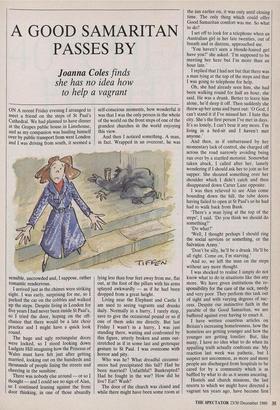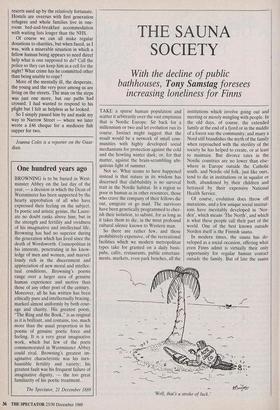A GOOD SAMARITAN PASSES BY
Joanna Coles finds
she has no idea how to help a vagrant
ON A recent Friday evening I arranged to meet a friend on the steps of St Paul's Cathedral. We had planned to have dinner at the Grapes public house in Limehouse, and as my companion was hauling himself over by public transport from west London and I was driving from south, it seemed a sensible, uncrowded and, I suppose, rather romantic rendezvous.
I arrived just as the chimes were striking eight. I was early, surprising for me, so I parked the car on the cobbles and walked up the steps. Despite living in London for five years I had never been inside St Paul's, so I tried the door, hoping on the off- chance that there would be a late choir practice and I might have a quick look round.
The huge and ugly rectangular doors were locked, so I stood looking down Ludgate Hill imagining how the Princess of Wales must have felt just after getting married, looking out on the hundreds and thousands of people lining the streets and cheering in the sunshine.
There was nobody else around — or so I thought — and I could see no sign of Alan, so I continued leaning against the front door thinking, in one of those absurdly self-conscious moments, how wonderful it was that I was the only person in the whole of the world on the front steps of one of the grandest churches in the world enjoying this view.
And then I noticed something. A man, in fact. Wrapped in an overcoat, he was lying less than four feet away from me, flat out, at the foot of the pillars with his arms splayed awkwardly — as if he had been dropped from a great height.
Living near the Elephant and Castle I am used to seeing vagrants and drunks daily. Normally in a hurry, I rarely stop, save to give the occasional pound or so if one of them asks me directly. But last Friday I wasn't • in a hurry, I was just standing there, waiting and confronted by this figure, utterly broken and arms out- stretched as if in some last and grotesque gesture to St Paul. I was overcome with horror and pity.
Who was he? What dreadful circumst- ances had precipitated this fall? Had he been married? Unfaithful? Bankrupted? Had he fought in the war? How did he live? Eat? Wash?
The door of the church was closed and while there might have been some room at the inn earlier on, it was only until closing time. The only thing which could offer Good Samaritan comfort was me. So what to do?
I set off to look for a telephone when an Australian girl in her late twenties, out of breath and in distress, approached me.
`You haven't seen a blonde-haired girl have you?' she asked. 'I'm supposed to be meeting her here but I'm more than an hour late.'
I replied that I had not but that there was a man lying at the top of the steps and that I was going to telephone for help.
Oh, she had already seen him, she had been walking round for half an hour, she said. He was a drunk. Better to leave him alone, he'd sleep it off. Then suddenly she threw up her arms and burst out: '0 God, I can't stand it if I've missed her. I hate this city. She's the first person I've met in days. It's so lonely, I can't bear it any more. I'm living in a bed-sit and I haven't met anyone.'
And then, as if embarrassed by her momentary lack of control, she charged off across the road narrowly avoiding being run over by a startled motorist. Somewhat taken aback, I called after her, lamely wondering if I should ask her to join us for supper. She shouted something over her shoulder which I didn't catch and then disappeared down Carter Lane opposite.
I was then relieved to see Alan come bounding down the hill, the tube doors having failed to open at St Paul's so he had had to walk back from Bank.
`There's a man lying at the top of the steps', I said. 'Do you think we should do something?'
`Do what?'
`Well, I thought perhaps I should ring the social services or something, or the Salvation Army.'
`Don't be silly, he'll be a drunk. He'll be all right. Come on, I'm starving.'
And so, we left the man on the steps without any more thought.
I was shocked to realise I simply do not know what to do in situations like this any more. We have given institutions the re- sponsibility for the care of the sick, needy and very poor. They perform this task out of sight and with varying degrees of suc- cess. Despite our instinctive faith in the parable of the Good Samaritan, we are buffered against ever having to enact it.
I have written countless articles on Britain's increasing homelessness, how the homeless are getting younger and how the younger are getting lonelier. But, like many, I have no idea what to do when its appalling truth actually confronts me, My reaction last week was pathetic, but I suspect not uncommon, as more and more people are discharged from hospitals to be cared for by a community which is as baffled by what to do as it seems uncaring.
Hostels and church missions, the last resorts to which we might have directed a vagrant ten years ago, have become first resorts used up by the relatively fortunate. Hostels are overrun with first generation refugees and whole families live in one- room bed-and-breakfast accommodation with waiting lists longer than the NHS.
Of course we can all make regular donations to charities, but when faced, as I was, with a miserable situation in which a fellow human being appears to need direct help what is one supposed to do? Call the police so they can keep him in a cell for the night? What crime has he committed other than being unable to cope?
More of the mentally ill, the desperate, the young and the very poor among us are living on the streets. The man on the steps was just one more, but our paths had crossed. I had wanted to respond to his plight but I felt as helpless as he looked.
So I simply passed him by and made my way to Narrow Street — where we later wrote a £46 cheque for a mediocre fish supper for two.
Joanna Coles is a reporter on the Guar- dian.











































































































 Previous page
Previous page